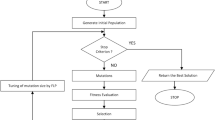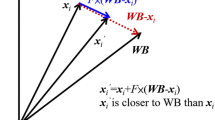Abstract
Evolutionary algorithm (EA) is considered as a simple, powerful and derivative free optimization technique derived from the concepts of nature with capabilities of parallel implementation. Many researchers have made use of variable length chromosome (VLC) and its related operators in Evolutionary optimization. It can be seen that many organisms survive by donating their food. If one donates some of his food, then he loses some of his food. A new operator is proposed based on donation of food. In the proposed donation operator, if a chromosome donates some of its genes to other chromosome then it loses some of the genes and the other chromosome which gets these genes will have an increase in the number of genes. It can also be seen from the nature that many organisms survive by sharing their knowledge and while sharing there is no loss on both sides. Based on the knowledge sharing, a new operator is proposed which shares the genes between two selected chromosomes thereby not losing any individual genes but gaining additional genes with increase in the length of the chromosomes. Evolutionary algorithm with the proposed operators is used to optimize fuzzy rules and the results prove that the new operators have merits.
Access this chapter
Tax calculation will be finalised at checkout
Purchases are for personal use only
Similar content being viewed by others
References
Harik, G.R., Lobo, F.G., Goldberg, D.E.: The compact genetic algorithm. IEEE Trans. Evol. Comput. 3(4), 287–297 (1999)
Francois, O.: An evolutionary strategy for global minimization and its markov chain analysis. IEEE Trans. Evol. Comput. 2(3), 77–90 (1998)
Alba, E., Tomassini, M.: Parallelism and evolutionary algorithms. IEEE Trans. Evol. Comput. 6(5), 443–462 (2002)
Kim, I.Y., Weck, O.L.: Variable chromosome length GA for progressive refinement in topology optimization. Struct. Multidisc. Optim. 29, 445–456 (2005)
Kim, I.Y., Weck, O.L.: Variable chromosome length genetic algorithm for structural topology design optimization. In: Proceedings of 45th AIAA-ASME-ASCE-AHS-ASC Structures, Structural Dynamics & Materials Conference, California, April (2014)
Khan, R.Z., Ibraheem, N.A.: Genetic shape fitting for hand gesture modeling and feature extraction using VLC. Br. J. Sci. 10(1) (2013)
Cavill, R., Smith, S.L., Tyrrell, A.M.: Variable length GA with multiple chromosomes on a variant of the Onemax problem. GECCO, USA, pp. 1405–1406 (2006)
Zhang, M., Deng, Y., Chang, D.: A novel genetic clustering algorithm with VLC representation. GECCO, Canada, pp. 1483–1484 (2014)
Schmitt, L.M.: Theory of genetic algorithms. Theoret. Comput. Sci. 259, 1–61 (2001)
Rogers, A., Prugel-Bennett, A.: Genetic drift in genetic algorithm selection schemes. IEEE Trans. Evol. Comput. 3(4), 298–303 (1999)
Yalcinoz, T., Altun, H., Uzam, M.: Economic dispatch solution using a genetic algorithm based on arithmetic crossover. In: IEEE Porto Power Tech Proceedings, vol. 2 (2001)
Oneill, M., Ryan, C., Keijzer, M., Cattolico, M.: Crossover in grammatical evolution. Genet. Program Evolvable Mach. 4, 67–93 (2003)
Guo, S.-M., Yang, C.-C.: Enhancing differential evolution utilizing eigenvector based crossover operator. IEEE Trans. Evol. Comput. 19(1), 31–49 (2014)
Bersini, H.: The immune and the chemical crossover. IEEE Trans. Evol. Comput. 6(3), 306–313 (2002)
Hutt, B., Warwick, K.: Synapsing variable-length crossover: meaningful crossover for variable-length genomes. IEEE Trans. Evol. Comput. 11(1), 118–131 (2007)
Rajesh, R., Kaimal, M.R.: GAVLC- GA with VLC for the simultaneous design and stability analysis of T-S fuzzy controllers. In: IEEE International Conference on Fuzzy Systems, WCCI 2008, pp. 1389–1396 (2008)
Rajesh, R., Kaimal, M.R.: GAVLCRG- Genetic algorithm with variable length chromosome-based rule generation scheme for fuzzy controllers. Adv. Fuzzy Sets Syst. 4(1), 33–66 (2009)
Cordon, O., Gomlde, F., Herrera, F., Hoffmann, F., Magdalena, L.: Ten years of genetic fuzzy systems: current framework and new trends. Fuzzy Sets Syst. 141, 5–31 (2004)
Ishibushi, H., Nozaki, K., Yamamoto, N., Tanaka, H.: Selecting fuzzy if-then rules for classification problems using genetic algorithm. IEEE Trans. Fuzzy Syst. 3(3), 260–270 (1995)
Lee, M., Takagi, H.: Integrating design stages of fuzzy systems using genetic algorithms. In: Proceedings of 2nd IEEE International Conference on Fuzzy Systems, San Francisco, CA, pp. 612–617 (1993)
Setnes, M., Roubos, H.: GA-fuzzy modeling and classification: complexity and performance. IEEE Trans. Fuzzy Syst. 8(5), 509–522 (2000)
Author information
Authors and Affiliations
Corresponding author
Editor information
Editors and Affiliations
Rights and permissions
Copyright information
© 2019 Springer Nature Switzerland AG
About this paper
Cite this paper
Reghunadhan, R. (2019). Sharing Without Losing and Donation: Two New Operators for Evolutionary Algorithm with Variable Length Chromosome. In: Ane, B., Cakravastia, A., Diawati, L. (eds) Proceedings of the 18th Online World Conference on Soft Computing in Industrial Applications (WSC18). WSC 2014. Advances in Intelligent Systems and Computing, vol 864. Springer, Cham. https://doi.org/10.1007/978-3-030-00612-9_14
Download citation
DOI: https://doi.org/10.1007/978-3-030-00612-9_14
Published:
Publisher Name: Springer, Cham
Print ISBN: 978-3-030-00610-5
Online ISBN: 978-3-030-00612-9
eBook Packages: Intelligent Technologies and RoboticsIntelligent Technologies and Robotics (R0)




